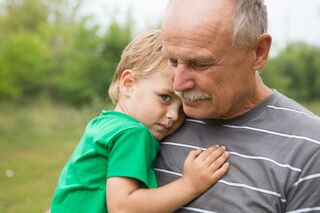Parenting
Supporting Adoptive, Foster, and Kinship Families
Trauma-informed parenting tips to improve outcomes.
Posted November 19, 2022 Reviewed by Vanessa Lancaster
Key points
- Babies and toddlers in foster or kinship care need new caregivers to understand the grief that comes with separation from a primary caregiver.
- Foster, adoptive, and kinship caregivers need high-quality information, support, and resources to care for their children.
- Practitioners are in a good position to bolster caregivers’ skills and capacity with trauma-informed positive parenting information and support.
Co-authored with Sarah MacLaughlin, LSW
Many providers work with diverse families, including grandfamilies, kinship, foster, and adoptive families. The caregivers in these circumstances have a unique job similar to and different from a typical caregiving role. Some skills and knowledge families need are simply “good enough” parenting, but others are specific to their particular situation.

“Good enough” parenting is known as "positive parenting." Zero to Three has identified nine parenting behaviors that comprise this responsive approach.
Positive parenting encourages caregiving adults to respond to a baby or child’s cues sensitively, keeping the child’s age, stage of development, and temperament in mind, all while remaining aligned with their personal family values. Here are a few more positive parenting skills to share with caregivers:
- Self-regulation is vital for supporting young children who have big emotions. It does not help babies or children feel safe and secure if the adult in charge is reacting in an overly emotional way. Babies and young children need co-regulation—a calm, regulated adult to model what self-regulation looks like, so they may learn this skill themselves.
- Perspective-taking strengthens empathy. When adults consider the viewpoint of the baby or child, they can more easily temper reactiveness, gain reflective functioning, and bring connection and compassion to the interaction. This makes it easier not to take things personally and makes space for all feelings.
- Seeking additional information on parenting can be a vital support. When caregivers have access to trusted sources of information and any needed referrals, they are more likely to thrive.
When there has been a separation between a child and caregiver for any reason, one of the most important ways providers can assist families is to consider and offer support around grief and loss. Even in adoptions that occur at birth, grief and loss are experienced throughout the adoption triad (adoptee/biological parents/adoptive parents), and both adults and young children may need support (Considering Adoption, n.d.). Even infants can experience grief, though it may look different than what’s expected, and can present as excessive crying, withdrawn behavior, or a baby with a flat affect (Halverson, 2018).
If a child has been removed from their home due to abuse, neglect, or for any other reason, there will be additionally complicated emotions—feelings of abandonment and rejection as well as fear, anger, denial, anxiety, and behavioral concerns (Considering Adoption, n.d.). Sometimes new caregivers are family members or grandparents, which can add further complexity. These families can find resources at the Grandfamilies & Kinship Support Network. Below are additional topics vital for caregivers to understand so they can provide support to children in these various out-of-home scenarios:
- Attachment is a key area for caregivers to be aware of. Attachment is affected when there is a disruption in the child-caregiver dyad, particularly when it occurs early in life, and social and emotional difficulties may develop (Considering Adoption, n.d.).
- Triggers can occur and be persistent, even in babies and young children, and may affect emotional regulation due to the initiation of the flight-fight-freeze response. Triggers are the brain’s way of making sure a scary event is not forgotten, which is a form of self-protection (AAP, 2020).
- Implicit memories (which differ from explicit, cognitive memories) can affect children who have experienced trauma, even when it seems they are “too young to remember.” As Bessel van der Kolk’s well known book indicates: the body keeps the score.
It is crucial for caregivers of children who have experienced trauma—or an interruption to the attachment relationship—to understand positive parenting approaches and trauma-informed parenting behaviors so they can be more effective with the babies and toddlers in their care. Trauma affects us all, and babies and toddlers are disproportionally impacted due to their unique and rapid period of brain development, where the brain is a sponge, soaking up all the bad alongside the good. Though child responses and behaviors post-trauma vary widely, it is uniquely important for caregivers to ensure consistent routines and a stable home environment that is both structured and warm (Considering Adoption, n.d.).
References
American Academy of Pediatrics. (2020, November 23). Parenting After Trauma: Understanding Your Child’s Needs. https://www.healthychildren.org/English/family-life/family-dynamics/ado…
Considering Adoption. (n.d.), Four Challenges Adopted Children Face and How You Can Help. https://consideringadoption.com/adopting/parenting-an-adopted-child/fou…
Halverson, K.K. (2018, March 6). How Infants Grieve: A Guide for New Adoptive Parents. https://adoption.com/how-infants-grieve-a-guide-for-new-adoptive-parent…


